情态动词(学案)
情态动词教学案

情态动词教学案一、教学目标1. 知识目标:学生能够准确理解情态动词的定义和用法。
2. 能力目标:学生能够正确运用情态动词表达推测、建议、义务、能力等不同的情态。
3. 情感目标:培养学生正确使用情态动词的语言交际意识,提高他们在语言表达中的准确性和地道性。
二、教学重难点1. 教学重点:使学生掌握情态动词的基本用法,能够在不同语境中正确运用。
2. 教学难点:使学生理解情态动词的语义细微差别,能够准确运用情态动词表达不同的情态。
三、教学准备1. 教材:教科书、课本、习题集等。
2. 多媒体设备:投影仪、电脑等。
3. 教具:课件、图片等。
四、教学过程1. 导入(教师出示一张图片,引导学生用情态动词描述图片中人物的状态。
)- 教师:请看这张图片,你看到了什么?- 学生:我看到一个男孩在弹吉他。
- 教师:非常好!请用一个情态动词描述一下他弹吉他的状态。
2. 情景演示(教师通过情景演示引入情态动词的概念和语法特点。
)- 教师:假设你是王明的好朋友,他妈妈想约他出去购物,但他正在忙于写作业,请你用情态动词向他的妈妈传达信息。
- 学生:王明,你妈妈想让你出去购物。
- 教师:是否可以使用情态动词来表达这一意思呢?- 学生:王明,你妈妈可能想让你出去购物。
3. 语法解释(教师用简洁明了的语言解释情态动词的定义和用法。
)- 教师:情态动词用来表达一种推测、建议、能力、义务等语气。
常见的情态动词有can、could、may、might、shall、should、will、would、must等。
请你们注意情态动词的用法和意义。
4. 练习(教师以填空的形式进行练习,巩固学生对情态动词的掌握。
)- 教师:请根据句意,选择合适的情态动词填空。
1) You ________ go to the party if you want to.2) He ________ be very tired. He has been working all day.3) ________ I borrow your pen, please?- 学生:1) can 2) must 3) May5. 拓展应用(教师出示一些真实语境,让学生运用所学情态动词进行对话练习。
2020高考英语总复习实用精品学案 高考语法专题 情态动词与虚拟语气 新人教版

高考语法专题:情态动词与虚拟语气考纲新研读情态动词1. can, could(1)表示能力或客观可能性、请求或允许:Man cannot live without air or water.(2)表示惊异、怀疑、不相信:How can you be so careless!He couldn’t be over sixty.(3)表示对过去否定或疑问的猜测:Jack cannot (couldn’t) have been to China, has he?Can (Could) he have heard the news?(4)表示虚拟语气,用于肯定句,could have done,“过去能够干某事而没干”。
I could have lent him money, but he didn’t ask me.Given more time, I could have done it even better.(5)表示“有时会”:Training alone can be dangerous.2. may, might(1)表示推测“可能”:That may or may not be true.(2)对过去可能性的推测,may (might可能性更小)have done:She may not have seen the film.She might have had an accident.(3)表示虚拟语气“有可能干而没干”:She might have given you more help, but she didn’t.(4)表示祝愿:May you succeed in passing the exam!3.must,have to(1)“必须”,“必要”:Soldiers must obey orders.You mustn’t talk like that.(2)肯定的猜测(不能用于否定或疑问):“一定”:He must be seventy now.He must be doing his homework upstairs.I think you must have made a mistake, didn’t you?He must have been doing his homework then.(3)(表示与说话人愿望相反及不耐烦)偏要Just as I was hurrying to class, Mary must come, telling a long story.4. need(1)“需要”,主要用于否定、疑问句。
情态动词学案

做。
• Key (情态动词) 1-5 AADAC 6-10 DDDAB 16-20 DCDCD 21-25 BBDBA 31-35 DACBD 36-40 CCCBB 46-50 DBDCB 51-55 DAAAD 61-65 CCCCB 66-70 ABBAD
11-15 BCBAC 26-30 CADCA 41-45 CCDAA 56-60 BABAC 71-75 BBAAB
7) It can /could be cold in the mountains.
(二) 1) May I come in?
2) --May I borrow your bike?
• --Yes, you can. / Yes, please. --No, you can’t. 2. 可能 (表推测,might并非过去时,而是比
2) I may/ might as well recommend/advise you to go to the movie. 我倒不如建议你去看电影。
3) You might as well listen to this song.
4) You may/ might as well read more books.
对过去否定的推测
(1) He may/might be an educator. (2) What do you think the artist may/might be doing? 你 觉得那个艺术家可能在做什么?
(3) He may/ might have visited the star. 他可能去见那个明星了。
高考英语语法精品学案:专题8 情态动词和虚拟语气.doc
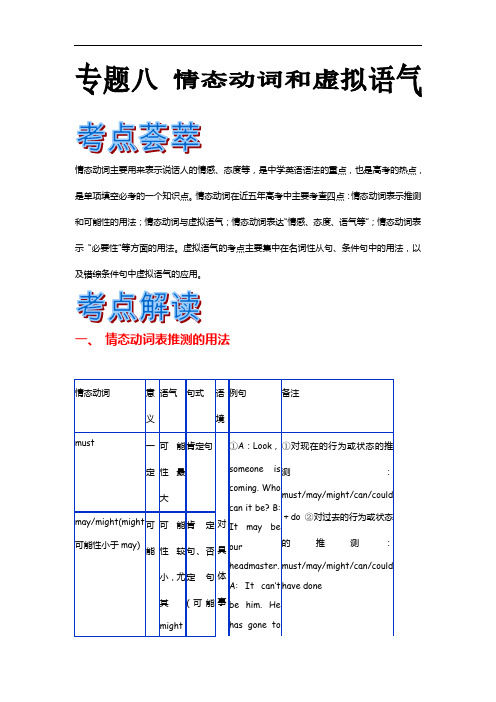
情态动词主要用来表示说话人的情感、态度等,是中学英语语法的重点,也是高考的热点,是单项填空必考的一个知识点。
情态动词在近五年高考中主要考查四点:情态动词表示推测和可能性的用法;情态动词与虚拟语气;情态动词表达“情感、态度、语气等”;情态动词表示“必要性”等方面的用法。
虚拟语气的考点主要集中在名词性从句、条件句中的用法,以及错综条件句中虚拟语气的应用。
一、情态动词表推测的用法It must beMr. Wang.He looks likeourheadmaster.②That may not be true.③He couldn't have discoveredthe truth.注意:should (ought to)表示推测是高考考查的重点和难点。
如:—When can I come for the photos?I need them tomorrow afternoon.—They ________ be ready by 12:00.A.can B.should C.might D.need【解析】B A项表示推测时常用于否定句和疑问句中。
C项表示推测语气不太肯定。
should意为“按理说,理应”,既回答了顾客的询问,不失礼貌,又为照片有可能尚未洗好,顾客到时取不到留下了回旋的余地,体现了店主的精明与用词经过仔细推敲。
二、情态动词的其他用法1.can, could, may, might2.must, should3. need, dare4.shall/will/would4.shall/will/would4.shall/will/would二、情态动词+have done四、虚拟语气虚拟语气表示说话人所说的话不是事实,而是一种假设、愿望、怀疑或推测。
1.虚拟语气在条件句中的用法If it were to rain tomorrow, I should not drive my car. 如果明天下雨的话,我就不开车了。
情态动词学案以及练习
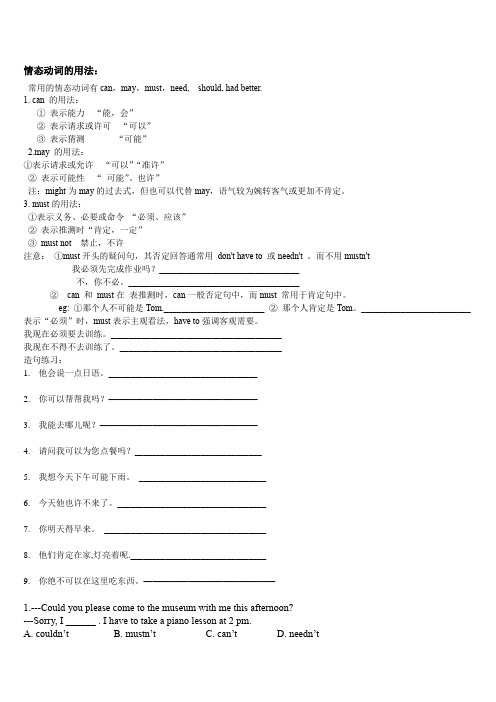
情态动词的用法:常用的情态动词有can,may,must,need,should, had better.1. can 的用法:①表示能力“能,会”②表示请求或许可“可以”③表示猜测“可能”2.may 的用法:①表示请求或允许“可以”“准许”②表示可能性“可能”、也许”注:might为may的过去式,但也可以代替may,语气较为婉转客气或更加不肯定。
3. must的用法:①表示义务、必要或命令“必须、应该”②表示推测时“肯定,一定”③must not 禁止,不许注意:①must开头的疑问句,其否定回答通常用don't have to 或needn't 。
而不用mustn't我必须先完成作业吗?________________________________不,你不必。
_______________________________________②can 和must在表推测时,can一般否定句中,而must 常用于肯定句中。
eg: ①那个人不可能是Tom._______________________②那个人肯定是Tom。
_________________________ 表示“必须”时,must表示主观看法,have to强调客观需要。
我现在必须要去训练。
_______________________________________我现在不得不去训练了。
_____________________________________造句练习:1.他会说一点日语。
__________________________________2.你可以帮帮我吗?—————————————————3.我能去哪儿呢?——————————————————4.请问我可以为您点餐吗?_____________________________5.我想今天下午可能下雨。
_____________________________6.今天他也许不来了。
高中英语语法--《情态动词与虚拟语气》教学案

一、情态动词的语法特征(1)情态动词不能表示正在发生或已经发生的事情,只表示期待或估计某事的发生。
(2)情态动词除ought 和have 外,后面只能接不带to 的不定式。
(3)情态动词没有人称,数的变化。
(4)情态动词没有非谓语形式,即没有不定式、分词、动名词等形式。
二、虚拟语气用来表示说话人的主观愿望或假想,所说的是一个条件,多半不是事实,或与事实相反。
高考重点要求:1、情态动词的基本用法2、情态动词表示推测的语义差别3、情态动词后接不定式完成体的不同意义4、虚拟语气中情态动词的用法情态动词(一) 情态动词在一般时否定句中的用法can't(cannot) 表示“不可能”,may not 表示“不可以”“可能不”,mustn't(must not) 表示“一定不要”,“不许可”,needn't (need not) 表示“不必”,dare not +动词原形表示“不敢”。
He can't know the news.He may not sleep now.You mustn't criticize her in that way.You needn't come tomorrow.He dared not meet his parents.(二)can,may,must三者用法比较can,may,must是三个最重要的情态动词1. can,may,must的肯定句You may eat lunch,but you must wash your hands. 你可以吃饭,但是你必须洗手。
(1)can表示能力;能,会She can run fast,but I can't. 她很会跑,但是我不会。
表示可能;能够I can get there in ten minutes. 我十分钟之后就可以到那儿。
(表示一种可能性)表示允许;许可You can use this dictionary. 你可以用这本字典。
专题08 虚拟语气与情态动词(教学案
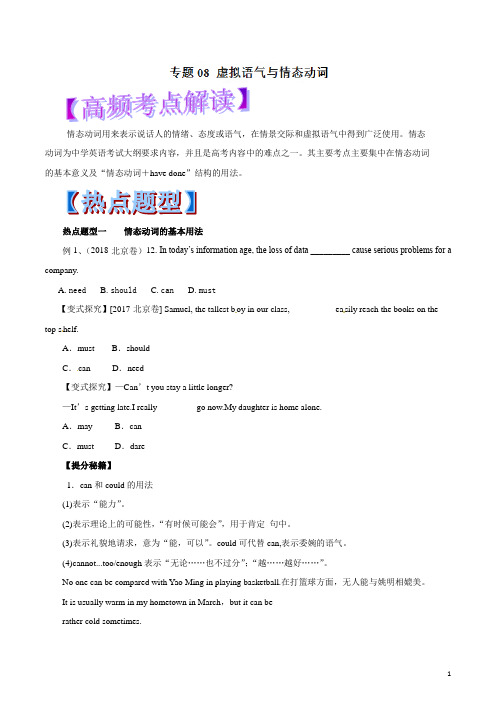
情态动词用来表示说话人的情绪、态度或语气,在情景交际和虚拟语气中得到广泛使用。
情态动词为中学英语考试大纲要求内容,并且是高考内容中的难点之一。
其主要考点主要集中在情态动词的基本意义及“情态动词+have done”结构的用法。
热点题型一情态动词的基本用法例1、(2018·北京卷)12. In today’s information age, the loss of data _________ cause serious problems for a company.A. needB. shouldC. canD. must【变式探究】[2017·北京卷] Samuel, the tallest b oy in our class, ________ ea sily reach the books on the top s helf.A.must B.shouldC.can D.need【变式探究】—Can’t you stay a little longer?—It’s getting late.I really ________ go now.My daughter is home alone.A.may B.canC.must D.dare【提分秘籍】1.can和could的用法(1)表示“能力”。
(2)表示理论上的可能性,“有时候可能会”,用于肯定句中。
(3)表示礼貌地请求,意为“能,可以”。
could可代替can,表示委婉的语气。
(4)cannot...too/enough表示“无论……也不过分”;“越……越好……”。
No one can be compared with Yao Ming in playing basketball.在打篮球方面,无人能与姚明相媲美。
It is usually warm in my hometown in March,but it can berather cold sometimes.我的家乡三月份通常很暖和,但有时候也会相当冷。
3.情态动词+have_done_结构(学案)
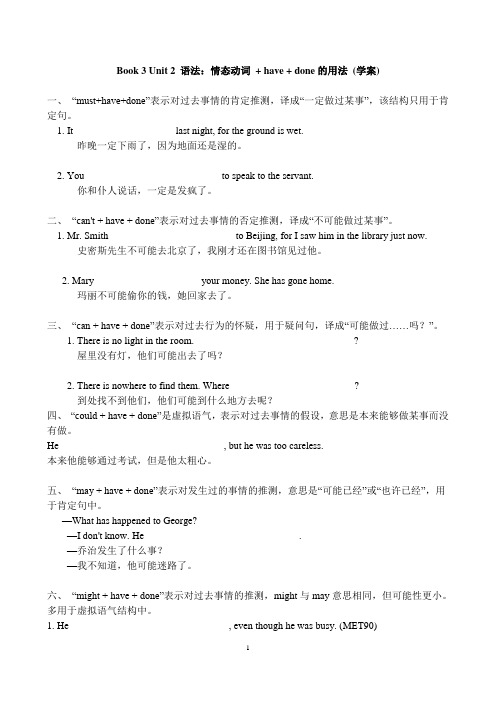
Book 3 Unit 2 语法:情态动词+ have + done的用法(学案)一、“must+have+done”表示对过去事情的肯定推测,译成“一定做过某事”,该结构只用于肯定句。
1. It ____________________last night, for the ground is wet.昨晚一定下雨了,因为地面还是湿的。
2. You ___________________________to speak to the servant.你和仆人说话,一定是发疯了。
二、“can't + have + done”表示对过去事情的否定推测,译成“不可能做过某事”。
1. Mr. Smith _________________________to Beijing, for I saw him in the library just now.史密斯先生不可能去北京了,我刚才还在图书馆见过他。
2. Mary _____________________your money. She has gone home.玛丽不可能偷你的钱,她回家去了。
三、“can + have + done”表示对过去行为的怀疑,用于疑问句,译成“可能做过……吗?”。
1. There is no light in the room.________________________________?屋里没有灯,他们可能出去了吗?2. There is nowhere to find them. Where_________________________?到处找不到他们,他们可能到什么地方去呢?四、“could + have + done”是虚拟语气,表示对过去事情的假设,意思是本来能够做某事而没有做。
He_________________________________, but he was too careless.本来他能够通过考试,但是他太粗心。
语法情态动词及虚拟语气

语法复习导学案(五)—-情态动词及虚拟语气【学习目标】1. Master the grammar rules and important points about the Modal verbs andSubjunctive Mood; promote your ability to solve problems2. Learn to analyze and solve problems by self-study and cooperation.3. Set up your confidence of conquering grammar and experience the pleasure.课前预习要求:25分钟之内完成预习案题目,核对答案,并积极动脑思考归纳情态动词及虚拟语气的用法和考点,标出疑惑点。
Ⅰ.情态动词考点归纳:考点清单一:情态动词基本含义的考查一. 情态动词can,could的用法:1. The police still haven’t found the lost child, but they’re doing all they ________.(11•四川)A. canB. mayC. mustD. should2-How’s your new babysitter?-We____ ask for a better one .All our kids love her so much. (11•浙江卷)A. shouldB. mightC. mustn'tD. couldn't3. The fire spread through the hotel very quickly but everyone____ get out.(08山东)A. had toB. wouldC. was able toD. could4. Peter ______ be really difficult at times even though he’s a nice person in general.(08辽宁)A. shallB. shouldC. canD. must5. Mr. Bush is on time for everything. How_____ it be that he was late for the opening ceremony?A. canB. shouldC. mayD. must思考:1)can的用法:____________________________________________________________ 2)can与be able to的区别:_____________________________________________________二.情态动词may/might的用法:1. Liza _________ well not want to go on the trip --- she hates traveling. (全国II)A. willB. canC. mustD. may2.—I don’t really like James. Why did you invite him?—Don’t worry. He______ come. He said he wasn’t certain what his plans were. (11•北京)A. must notB. need notC. would notD. might not3.----May I take this book out of the reading room?-----No, you ________. You read it in here.(10陕西)A. mightn’tB. won’tC. needn’tD. mustn’t思考:may/might的区别?如何对may问句进行肯定及否定回答?_______________________________________________________________________三. 情态动词must的用法:1. If you ________ go, at least wait until the storm is over.(11.辽宁)A. canB. mayC. mustD. will2.You _______park here! It’s an emergency exit. (10重庆)A. wouldn’tB. needn’tC. couldn’tD. mustn’t3.——Shall I inform him of the change of the schedule right now?——I am afraid you______, in case he comes late for the meeting . (11.福建)A. willB. mustC. mayD. can4. You_______ buy a gift, but you can if you want to. (10.湖南).A. mustB. mustn’tC. have toD. don’t have to思考:must的主要用法:__________________________________________________________ mustn’t:_________; must与have to有何区别?_________________________________________四.情态动词shall的用法1.——Will you read me a story, Mummy?—OK. You________ have one if you go to bed as soon as possible. (11.陕西)A. mightB. mustC. couldD. shall2.—What does the sign over there read?—“No person_____ smoke or carry a lighted cigarette, cigar or pipe in this area.”(07四川)A. willB. mayC. shallD. must3.—What’s the name?— Khulaifi. _____I spell that for you? (06北京)A. ShallB. WouldC. Can 4.D. Might总结:shall 的重点用法__________________________________________________________五.情态动词should的用法1. What do you mean, there are only ten tickets? There________ be twelve. (09海南)A. shouldB. wouldC. willD. shall2. This printer is of good quality. If it _______ break down within the first year, we would repair it at our expense. ( 09天津)A. wouldB. shouldC. couldD. might3. You can’t imagine that such a well behaved man ________be so rude to a lady.A. couldB. shouldC. mayD. would总结:should的重点用法:_________________________________________________________六. 情态动词need的用法1. —What sort of house do you want to have? Something big?—Well, it be big----that’s not important. (08陕西)A. mustn’tB. needn’tC. can’tD. won’t.考点清单二:情态动词表示推测的考查1.——I left my handbag on the train, but luckily someone gave it to a railway official.——How unbelievable to get it back! I mean, someone _____ it.(11江苏)A. will have stolenB. might have stolenC. should have stolenD. must have stolen2. Jack described his father, who _______a brave boy many years ago, as a strong---willed man. (10安徽) A. would be B. would have been C. must be D. must have been3.—I’m sorry. I______ at you the other day. (08江苏)—Forget it. I was a bit out of control myself.A. shouldn’t shoutB. shouldn’t have shoutedC. mustn’t shoutD. mustn’t have shouted4. You_______ be hungry already— you had lunch only two hours ago! (08浙江)A. wouldn’tB. can’tC. mustn’tD. needn’t5. He did not regret saying what he did but felt that he______ it differently. (09江苏)A. could expressB.would expressC. could have expressedD. must have expressed6.—Hi, Tom. Any idea where Jane is?—She_____ in the classroom. I saw her there just now. (09重庆)A. shall beB. should have beenC. must beD. might have been7. Mark______ have hurried. After driving at top speed, he arrived half an hour early. (10天津)A. needn’tB. wouldn’tC. mustn’tD. couldn’t总结:情态动词表推测的具体用法:________________________________________________ ________________________________________________________________________ II.虚拟语气考点归纳考点清单一:虚拟语气的基本用法1. If it were not for the fact that she ______ sing,I would invite her to the party. (06福建)A. couldn’tB. shouldn’tC. can’tD. might not2. If he__________ my advice, he wouldn't have lost his job. (10湖南)A. followedB. should followC. had followedD. would follow思考:虚拟语气有哪三种情况?_______________________________________________________________________________ _______________________________________________________________________________ 考点清单二:含蓄虚拟条件句1. I__________ through that bitter period without your generous help. (11陕西)A. couldn’t have goneB. didn’t goC. wouldn’t goD. hadn’t gone2. We ____John’s name on the race list yesterda y but for his recent injury. (11江西)A. will putB.will have putC. would putD. would have put3. Bob would have helped us yesterday, but he ___________. (10安徽)A. was busyB. is busyC. had been busy.D. will be busy4. They____ two free tickets to Canada, otherwise they’d never have been able to afford to go. (07山东) A. had got B. got C. have got D. get5.If it had not been for your timely help, I ________________________(fail) the exam.思考:含蓄虚拟条件句有何表现形式?______________________________________________ _______________________________________________________________________________ 考点清单三:错综时间虚拟条件句1. Maybe if I__________ science, and not literature then, I would be able to give you more help.(11北京) A. studied B. would study C. had studied D. was studying2.It’s hard for me to imagine what I would be doing today if I ______ in love,at the age of seven,with the Melinda Cox Library in my hometown. (08上海)A. wouldn’t have fallenB. had not fallenC. should fallD. were to fall思考:什么是错综时间虚拟条件句?________________________________________________ 考点清单四:名词性从句中的虚拟语气1.The old pianist wouldn’t listen to our repeated request that he _____in public again.A. playB. playedC. would play D was going to play2.Teachers recommend parents_______ their children under12 to ride bicycles to school for safety. (10福建)A. not allowB. do not allowC. mustn’t allowD. couldn’t allow思考:名词性从句中使用虚拟语气的词有哪些?_______________________________________________________________________________ 考点清单五:wish/if only/would rather/as if/It’s time that从句中的虚拟语气1. Look at the trouble I’m in,if only I ______ your advice!A. followedB. would followC. had followedD. should follow2.——Where are the children? The dinner’s going to be completely ruined.——I wish they________ always late. (11北京)A. weren’tB. hadn’t beenC. wouldn’t beD. wouldn’t have been3. Eliza remembers everything exactly as if it__________ yesterday. (06全国Ⅰ)A. was happeningB. happensC. has happenedD. happened4. George is going to talk about the geography of his country, but I’d rather he_______ more on its culture. (10江苏)A. focusB. focusedC. would focusD. had focused5. It’s time that we____________________________. (是我们睡觉的时间了)思考:wish/if only/would rather/as if/It’s time that从句中的虚拟语气分别是什么形式?_____________________________________________________________________________ 考点清单六:虚拟语气的倒装1. _______fired, your health care and other benefits will not be immediately cut off.(06 湖北)A. Would you beB. Should you beC. Could you beD. Might you be2. Had I known about this computer program, a huge amount of time and energy______.(10浙江) A. would have been saved B. had been saved C. will be saved D. was saved 思考:条件句中if省略,哪些词放句首?___________________________________________课内探究要求:根据预习学案问题的设计,在小组交流展示的基础上,归纳总结情态动词及虚拟语气的疑难考点。
2013高考英语二轮复习精品资料 专题08 情态动词和虚拟语气教学案(教师版)
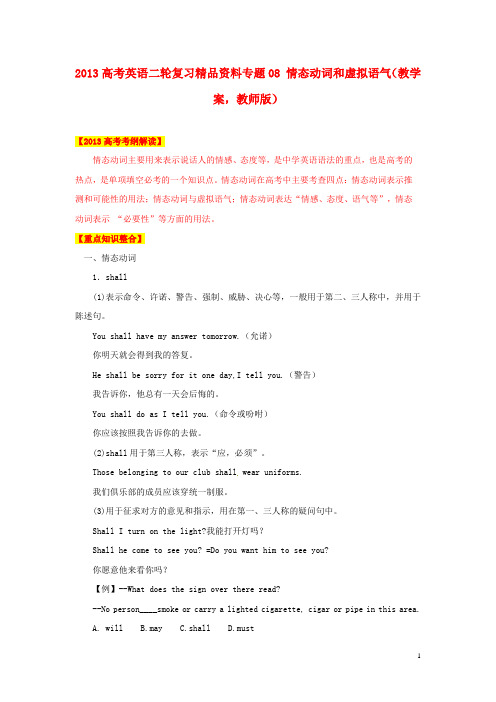
2013高考英语二轮复习精品资料专题08 情态动词和虚拟语气(教学案,教师版)【2013高考考纲解读】情态动词主要用来表示说话人的情感、态度等,是中学英语语法的重点,也是高考的热点,是单项填空必考的一个知识点。
情态动词在高考中主要考查四点:情态动词表示推测和可能性的用法;情态动词与虚拟语气;情态动词表达“情感、态度、语气等”,情态动词表示“必要性”等方面的用法。
【重点知识整合】一、情态动词1.shall(1)表示命令、许诺、警告、强制、威胁、决心等,一般用于第二、三人称中,并用于陈述句。
You shall have my answer tomorrow.(允诺)你明天就会得到我的答复。
He shall be sorry for it one day,I tell you.(警告)我告诉你,他总有一天会后悔的。
You shall do as I tell you.(命令或吩咐)你应该按照我告诉你的去做。
(2)shall用于第三人称,表示“应,必须”。
Those belonging to our club shall wear uniforms.我们俱乐部的成员应该穿统一制服。
(3)用于征求对方的意见和指示,用在第一、三人称的疑问句中。
Shall I turn on the light?我能打开灯吗?Shall he come to see you? =Do you want him to see you?你愿意他来看你吗?【例】--What does the sign over there read?--No person____smoke or carry a lighted cigarette, cigar or pipe in this area.A. willB.mayC.shallD.must【答案】C【解析】:shall可以用于第二,第三人称表说话者的命令、警告、意图、允诺和决心等,此处表示命令.2.will(1)表示意志、愿望或决心等。
高考英语二轮复习专题07情态动词和虚拟语气讲学案(含解析)

2021年高考英语二轮复习专题07情态动词和虚拟语气讲学案(含解析)情态动词的用法复杂多变,在高考试题中占的比重一直比较稳固,每年总有一至两个题,能够单独考查,也能够结合虚拟语气考查。
命题者常常利用语境和句子之间意义上的细微差别来考查考生对情态动词的明白得和把握,难度也保持较为稳固的趋势。
其考点要紧包括:1.考查情态动词的差不多用法。
如: can和could的用法及区别; will和would的用法及区别; must 的用法; shall用于不同人称时的用法和should的各种用法; need的用法等。
2.考查情态动词的“估量”功能。
如:can,could,may,might,must 皆可表示估量,使用时要注意以下几点:(1)注意语气。
语气较强用must, cannot,couldn't; 语气较弱用may,might或can,could;(2)注意句式。
在确信句中,一样用may,might,must; 在否定句、疑问句中常用can,could; (3)注意时态。
表示对现在或今后的情形的估量,现在通常用“情态动词+动词原形”结构;表示对现在或今后正在进行的情形进行估量,通常用“情态动词+进行体”结构;表示对过去情形的估量,通常用“情态动词+完成体”结构。
3.考查情态动词的专门用法。
如:(1)cannot/can't 与too/over/enough/perfectly/sufficiently 等词连用,意为“越……越……”“不管如何样……,……也不为过”“决可不能……,……够(过)”。
(2)cannot wait to do sth意为“急于做某事”。
(3)would 和used to的区别; can 和be able to的区别。
(4)“may/might well+动词原形”意为“理应,有足够的理由”;“may/might as well+动词原形”意为“还不如,不妨,依旧……的好”。
初中英语情态动词教案
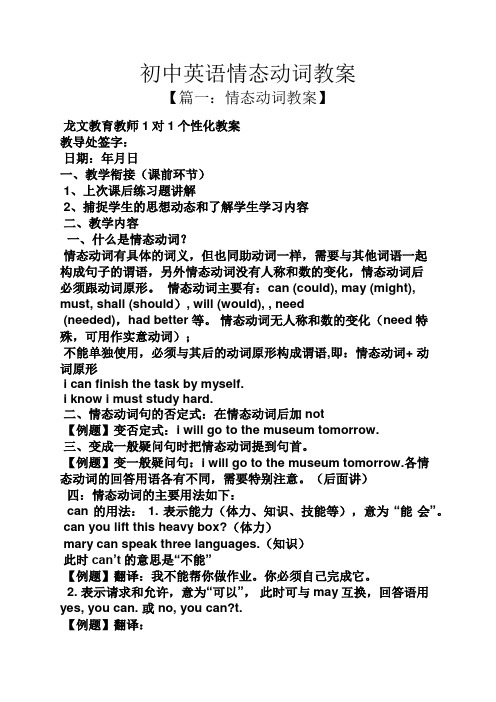
初中英语情态动词教案【篇一:情态动词教案】龙文教育教师1对1个性化教案教导处签字:日期:年月日一、教学衔接(课前环节)1、上次课后练习题讲解2、捕捉学生的思想动态和了解学生学习内容二、教学内容一、什么是情态动词?情态动词有具体的词义,但也同助动词一样,需要与其他词语一起构成句子的谓语,另外情态动词没有人称和数的变化,情态动词后必须跟动词原形。
情态动词主要有:can (could), may (might), must, shall (should), will (would), , need(needed),had better等。
情态动词无人称和数的变化(need特殊,可用作实意动词);不能单独使用,必须与其后的动词原形构成谓语,即:情态动词+ 动词原形i can finish the task by myself.i know i must study hard.二、情态动词句的否定式:在情态动词后加not【例题】变否定式:i will go to the museum tomorrow.三、变成一般疑问句时把情态动词提到句首。
【例题】变一般疑问句:i will go to the museum tomorrow.各情态动词的回答用语各有不同,需要特别注意。
(后面讲)四:情态动词的主要用法如下:can 的用法: 1. 表示能力(体力、知识、技能等),意为“能会”。
can you lift this heavy box?(体力)mary can speak three languages.(知识)此时can’t的意思是“不能”【例题】翻译:我不能帮你做作业。
你必须自己完成它。
2. 表示请求和允许,意为“可以”,此时可与may互换,回答语用yes, you can. 或 no, you can?t.【例题】翻译:——我现在可以走吗?——是的,你可以(走了)/ 不行,你不能 (走)。
could的用法:1. can的过去式,意为“能、会”,表示过去的能力。
情态动词教学设计案

情态动词设计学案一、教学内容分析:本课例是高一语法课。
主要内容是情态动词。
学生已经基本接触过情态动词,但是对情态动词的理解不够深刻。
本课例对提高学生对情态动词的用法和辨析有重要作用。
二、学情分析:本次授课的对象是高一理科班的学生。
学生在初中阶段已学过基本的情态动词,对情态动词有了一定的掌握,但是不够全面也不够具体。
三、教学设计思路:本次授课将情态动词按照其意义分为三个主要的知识点。
先从各个知识点讲起,配合例句帮助学生理解。
每讲完一个知识点都有几道小题进行测试。
三个知识点讲完后将有一个综合测试进行检测。
四、教学目标:在本课学习结束后,学生能够:1.掌握情态动词的基本用法。
2.掌握情态动词的辨析。
五、教学重点在本课中,教师的教学重点在于指导学生:1.能在合适的语境中调出正确的情态动词六、教学难点1.从整体上把握情态动词的语法和语义特征2. 掌握每个情态动词在实际语境中的用法特点及功能教学过程:Step1:Lead-in向学生展示情态动词的形式以及三个基本特点【设计意图】:导入本节课,让学生先了解情态动词有哪些以及情态动词所具备的特点有哪些。
Step2: the usage of the modal verbs情态动词的具体用法。
1.can/could/may/might的用法2.Will/would/shall/should的用法3.Must/have to/need/dare的用法【设计意图】:本环节采用讲授练习法。
先给学生讲解每个情态动词的特征,给出具体的语境,最后给出练习题进行检测。
Step3:Practice6道题对所讲的情态动词的用法及特点进行检测。
【设计意图】:本环节为练习环节,检测学生的掌握程度。
人教版四升五英语暑假衔接8第8讲情态动词can的用法(学案)

教案课题情态动词can的用法教师姓名××××学生姓名××××上课日期××××学科英语适用年级小学五年级教材版本通用版学习目标1.理解情态动词can.2. 掌握情态动词的变形.3. 掌握情态动词的回答.重难点重点:情态动词can的变形.难点:情态动词can后+动词原形.课前检查作业完成情况:优□良□中□差□建议:第10 讲情态动词can的用法根据所给提示填空。
1.He_________ _________ ________ _______ (会铺床).2.She________ _________ ________ _________(不会打扫房间).3.My mother_________cook the meal. 我妈妈会做饭。
4.Her sister_________speak English. 她姐姐会讲英语。
5._________ __________sing? 你会唱歌吗?一、情态动词can的概念情态动词can有一定的词义,但不能独立存在,它必须与动词原形一起构成谓语。
情态动词can 没有人称和数的变化,在句中放在谓语动词之前。
其过去式为could。
can的意思,一是:能,二是:许可二、情态动词can的用法(1)表示“能、会”,指脑力或体力方面的“能力”。
例如:I can speak English. .Jim can swim but I can't.(2)表示“可能”,常用于否定句或疑问句中,指某种可能性。
例如:Han Meimei can't be in the classroom.Can he come here today, please?(3)表示“可以”,常用于口语中,指许可或请求做某事。
例如:Can I have a cup of tea, please? You can go out.三、can的口诀:情态动词can、can、can,动词原形跟后面。
- 1、下载文档前请自行甄别文档内容的完整性,平台不提供额外的编辑、内容补充、找答案等附加服务。
- 2、"仅部分预览"的文档,不可在线预览部分如存在完整性等问题,可反馈申请退款(可完整预览的文档不适用该条件!)。
- 3、如文档侵犯您的权益,请联系客服反馈,我们会尽快为您处理(人工客服工作时间:9:00-18:30)。
2)You may use my dictionary. 你可以用我的字典。
3)We must study hard and make progress every day. 我们必须好好学习,天天向上。
(3) 用于祈使句,表示祝愿,如例句
(4) might 比 may 语气更委婉
may / might表示推测时,表示对现在或将来要发生的事情把握不大,如例句。
表示对过去发生的动作进行的可能性推测用________________。
e.g., 1) He 他可能去医务室了。
1
二、用法归纳
1. can and could:Look at the sentences and sum up the usage of the modal verbs.
1) 2)He be at home now.
3) I have a look? 4) How you be so rude?
Book 3--Unit 1 Grammar: Modal
一、情态动词的基本用法
情态动词表示说话人的预期或情绪,如可能、意愿、猜测、义务、需要等。情态动词有以下特征:
1、情态动词有一定的词义,但不能单独使用,必须与其后的动词原形构成谓语;
2、情态动词没有
3、情态动词除ought和have外,后面只能接;his be done by him. 8) It 归纳1:can and could
(1)表示能力, ,常译为“能,会”,如例句
(2)表示对现在或过去情况的推测时,只用在否定句或疑问句中,如例句
(3) 表示允许或请求 (在陈述句中属于“”),常译为“可以”, 如例句 _______。
(4) 用于否定句、疑问句中,表示惊讶、不相信、怀疑等, 如例句 。
(5) 用于肯定的陈述句中,表示理论上的可能性,也可表示一时的情况,如例句 _________。
e.g., Can/ Could I use your cell phone? 我可以用用你的手机吗?
2. may and might:Look at the sentences and sum up the usage of the modal verbs.
1) It be true. 2) 3) 5) He 6) Your mother 归纳2:may and might
(1)表示可能性,常用于肯定和否定句中, 如例句_______。
(2) 表示请求或许可(在陈述句中属于“”,在疑问句中属于“ 如例句_______ 。表示“请求”时,might 比may语气更委婉,类似could/与can。对其一般疑问句的肯定回答可用may 或can, 但要作出否定回答时要用________ 或________。mustn’t 表示“不可以,不许” 。
4、情态动词没有非谓语形式,即没有不定式、分词等形式。
5、但有些情态动词也有一般式和过去式的变化,如may/ might, will/ would, shall/ should 等。情态动词的“时态”形式并不是时间区别的主要标志,不少情况下,情态动词的现在形式和过去形式都可以用来表示现在时间、过去时间和将来时间。
